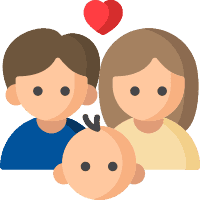From learning new crafts to playing with other children to coloring and painting, preschool can seem like a lot of fun. But it’s also a critical period for your child’s education, especially when preschool programs are thoughtfully structured.
Some parents are surprised when they learn about the importance of preschool for their children. That’s because most people imagine education begins with Kindergarten. And true, Kindergarten is where your child will take the first steps towards learning math and reading.
But preschool programs prepare your child to be a student. Successful pre-Kindergarten education can provide lasting academic, social, and emotional benefits for years to come.
Academic Benefits of Preschool
Most preschool and pre-Kindergarten programs focus on creating the foundation for specific academic skills. In preschool, your child’s academic education will focus on the following core competencies:
- Pre-literacy: Your child will be introduced to letters and the sounds they make. This pre-literacy education will help them be more prepared for Kindergarten.
- Pre-math: At the same time, your child will be introduced to numbers and counting. This will help prepare them for Kindergarten math lessons.
Lessons generally won’t teach your kiddo math and reading before they’re ready, so these pre-literacy and pre-math programs are not designed to teach your child how to read or how to multiply and subtract. Instead, the importance of education in preschool is based on providing a solid foundation, helping to prepare students for Kindergarten-based curriculum.
Learning Designed for Preschoolers
It’s also important to note how preschool helps prepare students for academic success. The way children learn at age 4 is vastly different from how kids learn at age 14. In a preschool setting, children may play structured matching games, sing songs, or do any number of fun activities that are also teaching them pre-literacy and pre-math skills.
There’s a lot of singing, play, and games because that’s how children learn! All of these activities are designed to reinforce fundamental pre-math and pre-literacy concepts in a way that your child can more easily digest. That’s why it’s difficult to underestimate the importance of play in preschool.
Social Benefits of Preschool
Academic achievement is not the only way that preschool can help children excel. The importance of preschool is also rooted in the ways that children learn essential social and emotional lessons. Children learn how to express and conduct themselves socially as students. Preschool will teach them:
- Patience: Most three or four year olds have a ton of energy! Preschool can help teach kids how to channel that energy in a way that encourages patience–at least, enough patience to listen to stories or process instructions.
- Student social behaviors: No one is born knowing how to raise their hand when they want to ask a question. Standard student social behavior, such as this, must be taught over time. Preschool provides a safe and supportive environment for children to learn those social habits.
- Social and Emotional Development: Preschool students will start learning how to express their thoughts and feelings in a communicative, productive way. They’ll also be taught how to accept others’ thoughts and feelings respectfully.
- How to be separate from their parents: For some children of preschool age–especially those with no daycare experience–pre-kindergarten lessons will represent their first real absence from their parents. Preschool presents an opportunity to begin defining themselves as individuals, separate and unique from their parents.
Language and Cognitive Benefits of Preschool
In addition to presenting academic and social benefits, preschool can also present specific and powerful language and cognitive benefits. In preschool, your child will learn:
- New vocabulary: Preschool instructors can create a vocabulary-rich setting for preschool students, introducing new words during snack time, craft projects, or other activities.
- Creative thinking: Preschool programs can introduce children to thought-provoking, open ended questions. This can help teach kids lateral and creative thinking.
- Problem solving: Creative thinking lessons can then be leveraged to help teach preschool students essential problem solving skills. Whether students are trying to recover from a broken pencil or choosing a crayon to color a new picture, they’re exercising valuable problem solving skills.
- Listening: Preschool students will learn how to use listening skills in a variety of contexts. Whether it’s following instructions or digesting what happened in a story, pre-K education offers plentiful opportunities for students to focus on what they’re hearing.
Children who have trouble meeting specific linguistic, cognitive, and social benchmarks in preschool can sometimes benefit from seeing a speech language pathologist. If necessary, speech therapy can help your child become better prepared for Kindergarten and beyond.
Recognizing the Importance of Preschool
All preschool programs are going to be different, so the benefits your student receives will vary depending on the rigor and thoughtfulness of the institution. However, the broad consensus among experts is that pre-kindergarten education can have a lifelong impact on learning, further emphasizing the importance of preschool. In particular, these programs can better prepare kids for the challenges they’ll encounter in Kindergarten.
It’s also worth mentioning that daycare and preschool are not equivalent. Unless a daycare has a specific preschool program (and you can inquire about that program’s accreditation), it may be better to sign your child up with a dedicated preschool.
The right approach to preschool can help your child develop academically, emotionally, and cognitively. If you have more questions about what your child’s pre-kindergarten education should look like, you can contact our offices directly or schedule a free, 15-minute phone consultation with a speech language pathologist to address your questions directly.


